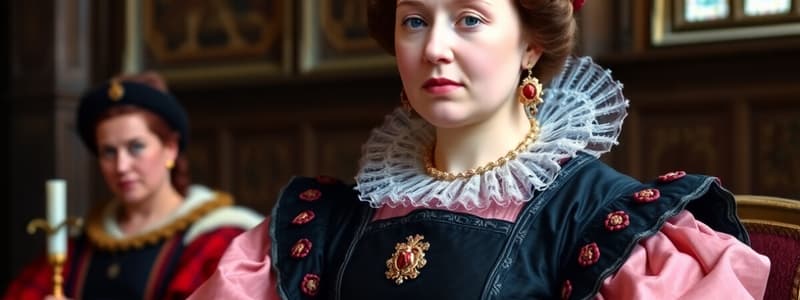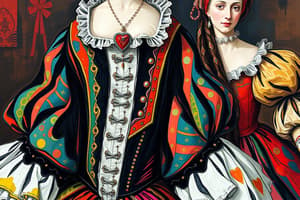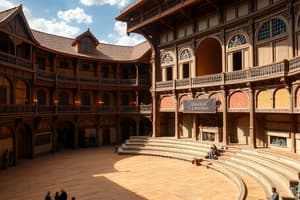Podcast
Questions and Answers
What was one of the primary internal challenges faced by Elizabeth's government?
What was one of the primary internal challenges faced by Elizabeth's government?
- Limited military funding
- Enforcement of laws (correct)
- Foreign invasions
- Economic sanctions
How often did the council meet during Elizabeth's rule?
How often did the council meet during Elizabeth's rule?
- Once a week
- Daily
- Three times a week (correct)
- Twice a week
What power did Elizabeth have over Parliament?
What power did Elizabeth have over Parliament?
- To enforce laws without consent
- To impose taxes independently
- To dissolve Parliament (correct)
- To increase the number of MPs at will
What issue could not be discussed freely in Parliament during Elizabeth's reign?
What issue could not be discussed freely in Parliament during Elizabeth's reign?
Which notable complaint did Puritan MP Peter Wentworth make?
Which notable complaint did Puritan MP Peter Wentworth make?
What type of influence did the council exert over Parliament?
What type of influence did the council exert over Parliament?
In what year did Parliament express concerns over monopolies?
In what year did Parliament express concerns over monopolies?
What was a common method for MPs to obtain their seats in Parliament?
What was a common method for MPs to obtain their seats in Parliament?
What role did William Cecil serve in Elizabeth's government?
What role did William Cecil serve in Elizabeth's government?
Who was responsible for maintaining law and order in a specific area of the country?
Who was responsible for maintaining law and order in a specific area of the country?
Which advisor was known as the 'spymaster'?
Which advisor was known as the 'spymaster'?
Which issue was a main concern for William Cecil?
Which issue was a main concern for William Cecil?
What was the role of Lords Lieutenants in Elizabeth's rule?
What was the role of Lords Lieutenants in Elizabeth's rule?
Which of the following describes the Royal Court during Elizabeth's reign?
Which of the following describes the Royal Court during Elizabeth's reign?
Who advised Elizabeth against war with Spain?
Who advised Elizabeth against war with Spain?
Which aspect of governance did Elizabeth and the Privy Council develop?
Which aspect of governance did Elizabeth and the Privy Council develop?
What was the primary role of the Privy Council in Elizabethan England?
What was the primary role of the Privy Council in Elizabethan England?
How did Elizabeth use patronage to secure support?
How did Elizabeth use patronage to secure support?
What was the purpose of progresses in Elizabethan England?
What was the purpose of progresses in Elizabethan England?
Which statement accurately describes the Privy Council's power structure?
Which statement accurately describes the Privy Council's power structure?
In what way did Elizabeth use performances to her advantage?
In what way did Elizabeth use performances to her advantage?
What was one effect of the Privy Council's composition?
What was one effect of the Privy Council's composition?
What significant advice did the Privy Council provide to Elizabeth?
What significant advice did the Privy Council provide to Elizabeth?
What mechanism did Elizabeth use to ensure no single noble could dominate the Privy Council?
What mechanism did Elizabeth use to ensure no single noble could dominate the Privy Council?
Flashcards
Parliament
Parliament
The group of people who make laws for the country. It consists of the House of Commons and the House of Lords.
Justice of the peace
Justice of the peace
A law enforcement official appointed by the Queen to maintain order and enforce laws at the local level.
Compromise
Compromise
A situation where both sides agree to give up something in order to reach a compromise. Elizabeth I used compromise to manage the challenges she faced.
Internal Threats
Internal Threats
Signup and view all the flashcards
Foreign Issues
Foreign Issues
Signup and view all the flashcards
Power Over Parliament
Power Over Parliament
Signup and view all the flashcards
Compromise
Compromise
Signup and view all the flashcards
Imprisonment
Imprisonment
Signup and view all the flashcards
Privy Council
Privy Council
Signup and view all the flashcards
Patronage
Patronage
Signup and view all the flashcards
Progreses
Progreses
Signup and view all the flashcards
Performances
Performances
Signup and view all the flashcards
Divide and Rule
Divide and Rule
Signup and view all the flashcards
Controlling Parliament
Controlling Parliament
Signup and view all the flashcards
The Privy Council: Effective but Corrupt
The Privy Council: Effective but Corrupt
Signup and view all the flashcards
Patronage: Corrupt but Effective
Patronage: Corrupt but Effective
Signup and view all the flashcards
Who were Elizabeth's closest advisors?
Who were Elizabeth's closest advisors?
Signup and view all the flashcards
William Cecil
William Cecil
Signup and view all the flashcards
Francis Walsingham
Francis Walsingham
Signup and view all the flashcards
Lords Lieutenants
Lords Lieutenants
Signup and view all the flashcards
The Privy Council
The Privy Council
Signup and view all the flashcards
The Royal Court
The Royal Court
Signup and view all the flashcards
What powers did Queen Elizabeth have?
What powers did Queen Elizabeth have?
Signup and view all the flashcards
What was Parliament?
What was Parliament?
Signup and view all the flashcards
Study Notes
Power in Elizabethan England
- Elizabeth needed trusted advisors to run the country.
- The Privy Council was a small group (19) who managed day-to-day affairs.
- Nobles in the Privy Council advised Elizabeth on domestic and foreign issues.
- Parliament, made up of the House of Commons and Lords, had the power to grant taxes and pass laws, but Elizabeth could dismiss Parliament.
- Elizabeth used patronage to gain support and loyalty. This involved awarding titles, land, monopolies, and powerful positions to those who supported her.
- Elizabeth toured the country to connect with her people and build relationships, seen as propaganda.
- Justices of the Peace maintained law and order at a local level, responsible for convicting and sentencing.
- Lords Lieutenants were appointed to govern particular areas of the country, collect taxes, and raise militias.
How Elizabeth Controlled Parliament
- Elizabeth controlled Parliament by dissolving it when necessary.
- Certain topics were prohibited from discussion in Parliament.
- Elizabeth used compromise to avoid conflict; MPs sometimes argued that monopolies were unfair.
- Some MPs were imprisoned for expressing dissent.
Elizabeth's Advisors
- William Cecil was Elizabeth's main advisor and Secretary of State for 40 years.
- He was concerned about Catholic threats and cautious about war with Spain.
- Francis Walsingham oversaw the secret service, known as the 'spymaster' and ensured the royal security.
- Elizabeth used a variety of methods and strategies, including propaganda and displays, to control her image and maintain power.
Patronage
- Elizabeth used patronage to get support from courtiers.
- Giving titles, land, monopolies, powerful positions as a reward.
- Highly effective in creating rivalry amongst courtiers seeking her favour.
Progresses
- Royal Court tours to nobles' homes
- Increased Elizabeth's image and popularity with her subjects.
Performances
- Magnificent displays and lavish banquets impressed foreign visitors.
- Propaganda to promote her image through performing rituals.
Studying That Suits You
Use AI to generate personalized quizzes and flashcards to suit your learning preferences.




